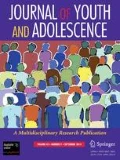Abstract
This research examined dependency and self-criticism and their relation to depression and social-personal adjustment. Seventy-seven subjects at a summer day camp, aged 8–14 years, completed the Depressive Experiences Questionnaire devised by Blatt et al. in 1992, the Center for Epidemiological Studies Depression Scale for Children devised in 1980, and a measure of self-esteem (SE) devised by Harter in 1982. Each subject was rated independently by two counselors on social, athletic, and general functioning. Results revealed that self-criticism, but not dependency, was positively related to depression. Moreover, self-criticism was associated with negative self-ratings in social and sports domains and in general SE. Counselor ratings confirmed social problems and perceptions of low SE for self-critics. Dependency was unrelated to self or counselor ratings, except for a trend toward a positive relation for social functioning. Analyses indicated a discrepancy between self and counselor ratings for self-critics but not for dependents, so that self-critics appear to exaggerate their weaknesses in social and athletic functioning. Finally, self-criticism decreased with age, while dependency was unrelated to age.
Similar content being viewed by others
References
Blatt, S. J. (1974). Levels of object representation in anaclitic and introjective depression.Psychoanal. Study Child 24: 107–157.
Blatt, S. J., D'Afflitti, J. P., and Quinlan, D. M. (1976). Experiences of depression in normal young adults.J. Abnorm. Psychol. 85: 383–389.
Blatt, S. J., Quinlan, D. M., Chevron, E. S., McDonald, C., and Zuroff, D. C. (1982). Dependency and self-criticism: Psychological dimensions of depression.J. Consult. Clin. Psychol. 50: 113–124.
Blatt, S. J., Schaffer, C. E., Bers, S. A., and Quinlan, D. M. (1992). Psychometric properties of the depressive experiences questionnaire for adolescents.J. Personal. Assess. 59: 82–98.
Blatt, S. J., and Shichman, S. (1983). Two primary configurations of psychopathology.Psychoanal. Contemp. Thought 6: 187–254.
Blatt, S. J., and Homann, E. (1992). Parent-child interaction and the etiology of dependent and self-critical depression.Clin. Psychol. Rev. 12: 47–91.
Blatt, S. J., and Zuroff, D. C. (1992). Interpersonal relatedness and self-definition: Two prototypes for depression.Clin. Psychol. Rev. 12: 527–562.
Deci, E. L., and Ryan, R. M. (1991). A motivational approach to self: Integration in personality. In Dienstbier, R., and Ryan, R. M. (eds.),Nebraska Symposium on Motivation: 1990, University of Nebraska Press, Lincoln, NE.
Faulstich, M. E., Carey, M. P., Ruggiero, L., Enyart, P., and Gresham, F. (1986). Assessment of depression in childhood and adolescence: An evaluation of the Center for Epidemiological Studies Depression Scale for Children (CES-DC).Am. J. Psychiat. 143: 1024–1027.
Fichman, L., Koestner, R., and Zuroff, D. C. (1994). Depressive styles in adolescence: Assessment, relation to social functioning, and developmental trends.J. Youth Adolesc. 23: 315–330.
Harter, S. (1982). The Perceived Competence Scale for Children.Child Develop. 53: 87–97.
Klerman, G. L. (1988). The current age of youthful melancholia: Evidence for increase in depression among adolescents and young adults.Br. J. Psychiat. 152: 4–14.
Koestner, R., Zuroff, D. C., and Powers, T. A. (1991). Family origins of adolescent self-criticism and its continuity into adulthood.J. Abnorm. Psychol. 100: 191–197.
Lewinsohn, P. M., Rohde, P., Seeley, J. R., and Fischer, S. A. (1993). Age-cohort changes in the lifetime occurrence of depression and other mental disorders.J. Abnorm. Psychol. 102: 110–120.
Luthar, S. S., and Blatt, S. J. (in press). Differential vulnerability of dependency and self-criticism among disadvantaged teenagers.J. Res. Adolesc.
Mongrain, M., and Zuroff, D. C. (1994). Ambivalence over emotional expression and negative life events: Mediators of depressive symptoms in dependent and self-critical individuals.Personal. Individu. Diff. 16(3): 447–458.
Nietzel, M. T., and Harris, M. J. (1990). Relationship of dependency and achievement/autonomy to depression.Clin. Psychol. Rev. 10: 279–297.
Petersen, A. C., Compas, B. E., Brooks-Gunn, J., Stemmler, M., Ey, S., and Grant, K. E. (1993). Depression in adolescence.Am. Psychol. 48: 155–168.
Shaffer, D. R. (1988).Social and Personality Development. (2nd Ed.). Brooks/Cole Publishing Company, Pacific Grove, CA.
Weissman, M., Orvaschell, H., and Padian, N. (1980). Children's symptom and social functioning: Self-report scales.J. Nerv. Mental Disord. 168: 736–740.
Zuroff, D. C. (1992). New directions for cognitive models of depression.Psych. Inquiry 3(3): 274–277.
Zuroff, D. C., and Fitzpatrick, D. A. (1995). Depressive personality styles: Implications for adult attachment.Personal. Individ. Diff. 8: 253–265.
Zuroff, D. C., Igreja, I., and Mongrain, M. (1989). Dysfunctional attitudes, dependency, and self-criticism as predictors of depressive mood states: A 12-month longitudinal study.Cog. Ther. Res. 14: 315–326.
Zuroff, D. C., Koestner, R., and Powers, T. A. (1994). Self-criticism at age 12: A longitudinal study of adjustment.Cog. Ther. Res. 18(4): 367–385.
Zuroff, D. C., Moskowitz, D. S., Wielgus, M. S., Powers, T. A., and Franko, D. L. (1983). Construct validation of the dependency and self-criticism scales of the depressive experiences questionnaire.J. Res. in Personal. 17: 226–241.
Zuroff, D. C., and Mongrain, M. (1987). Dependency and self-criticism: Vulnerability factors for depressive affective states.J. Abnorm. Psychol. 96: 14–22.
Author information
Authors and Affiliations
Additional information
Received B. A. from McGill University. Research interests include personality development and psychosocial adjustment. To whom correspondence should be addressed.
Received Ph.D. from the University of Rochester. Research interests include motivation, personality, and life-span development.
Received Ph.D. from the University of Connecticut. Research interests include dependency, self-criticism, and vulnerability to depression.
Rights and permissions
About this article
Cite this article
Fichman, L., Koestner, R. & Zuroff, D.C. Dependency, self-criticism, and perceptions of inferiority at summer camp: I'm even worse than you think. J Youth Adolescence 25, 113–126 (1996). https://doi.org/10.1007/BF01537383
Received:
Accepted:
Issue Date:
DOI: https://doi.org/10.1007/BF01537383




